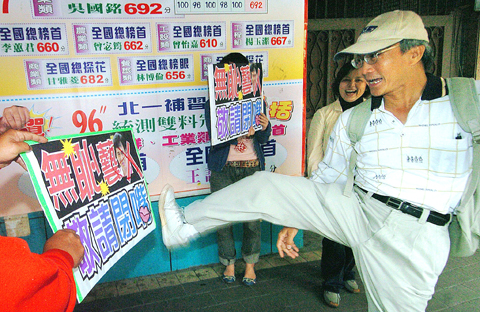Taipei Mayor Hau Lung-bin (郝龍斌) said yesterday that action star Jackie Chan's (成龍) tenure as ambassador for the Deaflympics ended last year and urged the public not to politicize sports, amid a furor over the celebrity's anti-democratic remarks.
Chan's position as an ambassador for September's Deaflympics, which will be the biggest sports event ever hosted by Taipei, sparked controversy after he described freedom in Taiwan as “chaotic” during a panel discussion at the annual Boao Forum in Hainan, China, last week.
“Each of the ambassadors we invited has a different mission and Jackie Chan's work was done last year ... The Deaflympics is an international sports event, and we don't want the event to become politicized,” Hau said at Taipei City Hall.

PHOTO: CHIEN JUNG-FONG, TAIPEI TIMES
Hau's remarks came as Chan's spokesman said the star's comments had been taken out of context.
Solon So (蘇志游), the chief executive of Chan's company JC Group and his main spokesman, told reporters in a telephone interview yesterday that the actor was referring to freedom in the entertainment industry and not Chinese society at large.
“Some people with ulterior motives deliberately misinterpreted what he was saying,” So said.
The comments came as Facebook users and Chinese academics condemned the veteran actor on the Internet in a spreading backlash.
A group of Chinese academics published a letter online on Monday accusing Chan of “not understanding how precious freedom is,” even though “free Hong Kong provided the conditions for you to become an international action star.”
A Facebook group set up by Hong Kong users calling for Chan to be exiled to North Korea had drawn more than 2,600 members by yesterday afternoon.
The group also posted form letters urging Hong Kong's Baptist University and Academy for Performing Arts to strip Chan of honorary degrees they had given the actor.
Emile Sheng (盛治仁), chairman of the Taipei Deaflympics Organizing Committee, said Chan was only one of more than 10 ambassadors the city government has invited to promote the event.
Chan came to Taiwan in September to participate in one of the promotional activities and shot — for free — a TV advertisement for the sports event, Sheng said.
Other ambassadors, including singer A-Mei (張惠妹) and actress Lin Ching-hsia (林青霞), had also promoted the event for the city government on different occasions, he said.
Asked whether Chan would be invited to the opening ceremony, Hau said the city government would not invite him to join the ceremony, but would not refuse if the actor wanted to attend.
“We are inviting athletes, important figures in the sports field and foreign guests, but we won't say no to those who want to come,” he said.
Sheng said the organizing committee had invited six-time NBA champion Scottie Pippen to promote the Deaflympics this weekend and would continue to invite other well-known athletes and celebrities to serve as ambassadors.
Pippen, a former Chicago Bulls forward, will arrive in Taipei on Friday and participate in several basketball games with local players to promote the Deaflympics, Sheng said.
Taipei won the bid to host this year's event in 2003. Over 11 days, around 4,000 athletes from 81 countries will compete in events including track and field, badminton, basketball and bowling, the committee said.
ADDITIONAL REPORTING BY AP

A preclearance service to facilitate entry for people traveling to select airports in Japan would be available from Thursday next week to Feb. 25 at Taiwan Taoyuan International Airport, Taoyuan International Airport Corp (TIAC) said on Tuesday. The service was first made available to Taiwanese travelers throughout the winter vacation of 2024 and during the Lunar New Year holiday. In addition to flights to the Japanese cities of Hakodate, Asahikawa, Akita, Sendai, Niigata, Okayama, Takamatsu, Kumamoto and Kagoshima, the service would be available to travelers to Kobe and Oita. The service can be accessed by passengers of 15 flight routes operated by

GIVE AND TAKE: Blood demand continues to rise each year, while fewer young donors are available due to the nation’s falling birthrate, a doctor said Blood donors can redeem points earned from donations to obtain limited edition Formosan black bear travel mugs, the Kaohsiung Blood Center said yesterday, as it announced a goal of stocking 20,000 units of blood prior to the Lunar New Year. The last month of the lunar year is National Blood Donation Month, when local centers seek to stockpile blood for use during the Lunar New Year holiday. The blood demand in southern Taiwan — including Tainan and Kaohsiung, as well as Chiayi, Pingtung, Penghu and Taitung counties — is about 2,000 units per day, the center said. The donation campaign aims to boost

ENHANCING EFFICIENCY: The apron can accommodate 16 airplanes overnight at Taoyuan airport while work on the third runway continues, the transport minister said A new temporary overnight parking apron at Taiwan Taoyuan International Airport is to start operating on Friday next week to boost operational efficiency while the third runway is being constructed, the Ministry of Transportation and Communications said yesterday. The apron — one of the crucial projects in the construction of the third runway — can accommodate 16 aircraft overnight at the nation’s largest international airport, Minister of Transportation and Communications Chen Shih-kai (陳世凱) told reporters while inspecting the new facility yesterday morning. Aside from providing the airport operator with greater flexibility in aircraft parking during the third runway construction,

American climber Alex Honnold is to attempt a free climb of Taipei 101 today at 9am, with traffic closures around the skyscraper. To accommodate the climb attempt and filming, the Taipei Department of Transportation said traffic controls would be enforced around the Taipei 101 area. If weather conditions delay the climb, the restrictions would be pushed back to tomorrow. Traffic controls would be in place today from 7am to 11am around the Taipei 101 area, the department said. Songzhi Road would be fully closed in both directions between Songlian Road and Xinyi Road Sec 5, it said, adding that bidirectional traffic controls would